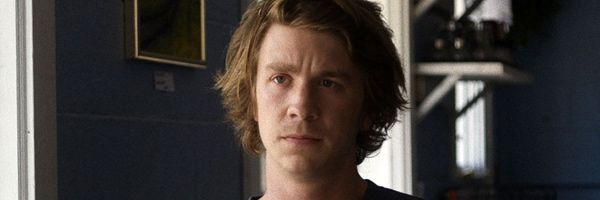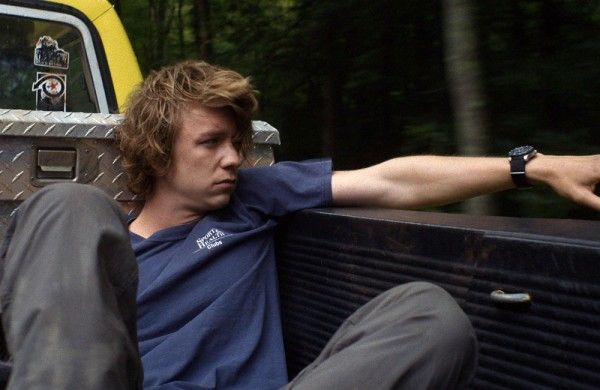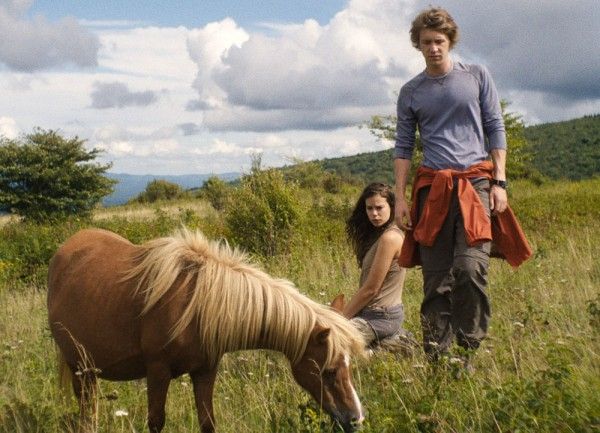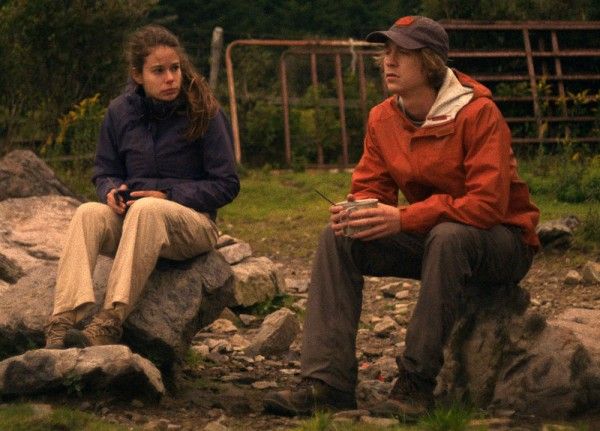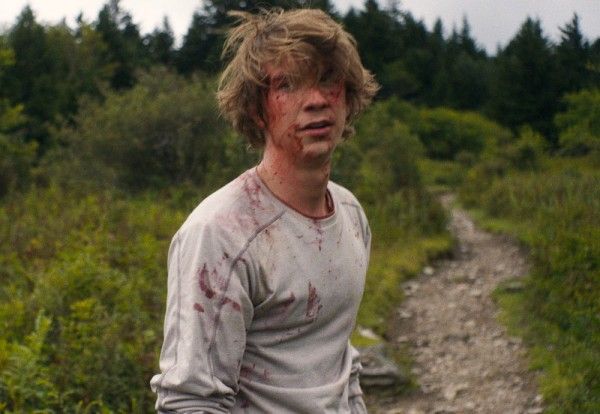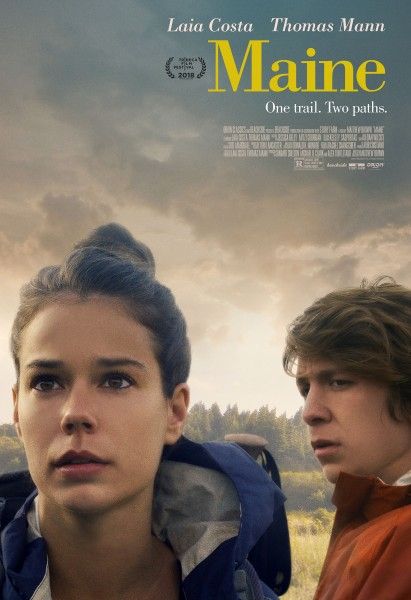From writer/director Matthew Brown, the indie drama Maine follows Bluebird (Laia Costa), a married woman from Spain who attempts to hike the entire Appalachian Trail by herself, but when she comes across American hiker Lake (Thomas Mann), they continue on the journey together. Even though they develop an emotional and romantic connection, Bluebird must ultimately decide whether to return to her solo trip and face her own feelings while looking for clarity on life.
During this 1-on-1 phone interview with Collider, actor Thomas Mann talked about the unusual nature of the storytelling in Maine, the film’s collaborative atmosphere, getting to do different versions of a lot of the scenes, having Laia Costa as a co-star, and the challenge of being out in the elements, every day. He also talked about playing Jim Dear in the live-action version of Lady and the Tramp, the experience of working with real dogs, the film’s tone, and how beautiful the production design is, along with shooting The Highwaymen, and the director that he’d most like to work with.
Collider: Really tremendous work on this. This is such an interesting film because there’s really just two of you, off in the wilderness, with a whole opening that has no dialogue. Was the unusual nature of this project part of the appeal?
THOMAS MANN: Yeah, exactly. I was looking for something like this because I thought it would be a real acting exercise for myself and I liked how sparse the dialogue was in the script. There wasn’t a whole lot written. Sometimes it was just scenarios, and then we would get there, on the day, and fill it in with our own dialogue. We got to improvise quite a bit, and we had a big rehearsal period, so we shaped a lot of the scenes during that time, as well. I was looking for something that was kind of quiet and that would rely on just the subtleties of the actors. I had just done Kong: Skull Island, so I was looking for something a little bit more intimate, quieter and more meditative, and Maine was like the perfect anecdote to that. It was great timing, and I’m glad it found me when it did.
One of my favorite scenes is the one that you guys have together in the diner, where you can tell that there are so many things that you want to say, but you just don’t say any of them.
MANN: Yeah, that’s what made it so much fun. [Writer/director Matthew Brown] said, “Now, have this conversation, but you can’t say any words. It’s just in your head, but try to get it across through your faces and your overall behavior.” That was actually a lot of fun. And we shot different versions of a lot of scenes, so I’m sure there was a version that did have dialogue, but then Matt when in and reshaped it all. That character feels like he’s owed something, but then has to come to terms with the fact that he’s actually not owed anything. As this person spends time with him on the trail, there’s nothing promised there, for the future, and he has to come to terms with that, and I found that heartbreaking. There was definitely a lot of layers to play in this movie, and there was not a lot that you could lean on. It was on our faces, the whole time, but that just made us rise to the occasion.
What was it like to have such creative freedom with the material that you were working with? Did it take some adjustment to deal with that, or was it something that you hope to be able to keep doing, as far as having a say in the material?
MANN: I guess it depends on the script and the story, and whether or not it lends itself to that sort of thing. Obviously, if they are shooting some talky mobster movie and there is lots of fast dialogue, that’s harder to mess around with. You could ruin the rhythm of a scene when it’s super written out like that, with a lot of heavy dialogue. With this, where it was pretty light on dialogue, you can go in and tweak things or sometimes even take things out. For this movie it was about just knowing what the scene was, and then taking the actual words out of it. That was a really cool little experiment. I love anytime an actor has the freedom to not necessarily change the dialogue, but enhance it and put it though your own filter. Matthew was really great about that. Me and Laia both spent a lot of time in rehearsals, saying what didn’t feel natural, or what we wanted to focus more on. It was a very collaborative experience, in that way.
Where there any major changes that were made, either in the rehearsal process, or as you guys were shooting?
MANN: It’s so hard to remember now because we shot this so long ago. I think the sequence of events changed significantly. Depending on what mood I was in, on the day, when we were sitting on this rock overlooking this big valley, or when it was raining all day and I might have been a little more miserable looking, Matt just shaped it around our performances, which is really cool. There was a lot of freedom to try the scene several different ways, and then Matt would decide, later on, where he was gonna put it in the movie, which was interesting.
In order for this film to work, since it is basically just two characters, you have to want to watch these two people together. What was it like to have Laia Costa to experience this with?
MANN: You couldn’t ask for a better scene partner than Laia. She is so generous and present, and there’s nothing that is too much for her. Whatever you throw at her, she will throw it back at you, twice as hard. That was actually really fun, especially for the scenes where we were drunk by a fire. We were genuinely having a great time while we were doing it, and I think it shows. She was so great. We really took care of each other. It was rough, just being outside in the elements, every day. It’s not like we had trailers to go back to. We were essentially hiking the Appalachian trail, and it was rough sometimes, but we both knew that we wanted to make this movie work and that we couldn’t complain, so we didn’t.
You went from doing something so sparse like this, to doing something like Lady and the Tramp. What’s it like to be on a set when you are one of the only human characters?
MANN: Thank you for asking about that because it is very strange. Obviously, Lady and the Tramp is a little more comedic, for my character, at least. I get to be little more broad because of its period. That was actually something that was very, very different for me, whereas Maine is a character that’s the closest to myself that I’ve ever played.
There is such an interesting trend with these Disney classics, like Beauty and the Beast, Dumbo, The Lion King and now Lady and the Tramp, where we’re getting to see them in a different way. What most excites you about the way that you’re telling the story of Lady and the Tramp?
MANN: I really think it’s an enhanced version of the world that you saw before. Obviously, the human characters are a little more flushed out. They’re not these passing faces that you barely get a glimpse of. You get to know them a little bit better. And also, there are real dogs. Who doesn’t want to see two real dogs kiss over a plate of spaghetti? That is the main draw for me. You get the charisma of real dogs in there. Lady and the Tramp came out in 1955. I understand people who are like, “Don’t mess with the original,” but they aren’t re-animating it. It’s a live-action remake. So, why not?
Did you actually get to act with dogs, or were they not there?
MANN: The dogs were there. We shot with the dogs, every day. They were on set and they weren’t even trained. They found these dogs and started training them about three months before. They just wanted to find the perfect dogs. The main dog’s name was Rose, who played Lady. It was crazy because they didn’t know they were working, so they would run off in the middle of a take, and then come back over. You have to be extra patient because you have to be good every time for when they are good once. It was a lot of fun. It was so cute, every day, to just have a bunch of dogs to play with. It made the job a lot less stressful.
I’m excited about it because I love that story, but I also think it will be really interesting to see what’s done with it because it does feel like there are so many possibilities.
MANN: It’s a little more dramatic, too. I wouldn’t say that it’s a full-on drama or anything, but it’s a little more grown up, in its own way, and a little more sophisticated. It looks beautiful, in the few things that I’ve seen, from the way it was shot. The production design, alone, is pretty immaculate.
That’s so cool! I cried with the Dumbo trailer, so I’m excited to see what Lady and the Tramp looks like, as well.
MANN: Just wait! It will be amazing! These dogs are movie stars.
You’ve been acting since you were pretty young. At what point did you feel like the roles you were playing were really transitioning into the type of roles you want to do now, as an adult?
MANN: I don’t know. It’s so weird because since I’ve started, I’ve had people telling me, “You’re really breaking out now! This is your year! Everything is gonna change!” And they’re right, to an extent, but you’re always competing with yourself. You hear a lot of older actors say, “You’re just competing with yourself. Don’t worry about anything.” I don’t have to be Timothée Chalamet right now. Everyone goes on their own weird path. I actually have been so happy with the way things have progressed. If you told me, ten years ago, the kinds of projects that I would be doing now, I never would have believed it. I just feel so lucky, all of the time. As you get older, you stop comparing yourself to other people, and you start to see your own lane. There are so many jobs now for actors. There is enough to go around, if you just keep at it. Being in something like Lady and the Tramp or The Highwaymen, which I did with Woody Harrelson and Kevin Costner, I have wedding rings in both of those movies, and that’s totally crazy. I’m not someone’s son or a student. I’m a man who’s out in the world, doing things. That’s really exciting. It’s a whole new set of parts that are open to me now.
What was it like to do The Highwaymen and to work with Kevin Costner and Woody Harrelson, who any actor would be happy to have the careers of?
MANN: It can be intimidating, but you have to act like you can hang. You fake it ‘til you make it, and then you’re not intimidated. Eventually, they become more and more comfortable, and they’re like, “This kid is a good actor.” You just keep at it. I had a great time working with such legends. My thing now is that I just want to work with people that I admire. That’s what keeps it exciting and challenging. You want people to keep you on your toes.
Are there directors on your bucket list, that you would love to get the opportunity to work with?
MANN: Yeah, I have lots, actually. I have a whole list written down in my iPhone. I’ve shown it to my agent and they were like, “Yeah everyone wants to work with these people!” I don’t want to say because I don’t want to jinx it, but I do have favorites that are at the top of my list. Obviously, I would love being in a Paul Thomas Anderson movie, one day. That’s probably peak for me. There’s something so precise about his filmmaking. I just want to work with directors that I admire, and try to be in movies that I would want to go see myself. That’s hard to do because it takes a long time to get to that point. If you have good taste, those are the movies that everyone else wants to be in. You just do the best that you can and you hope the stars align. If you make a couple of good movies in your life, then that’s a decent career. I’m just keeping at it.
Maine is in theaters, on-demand and on digital HD.

